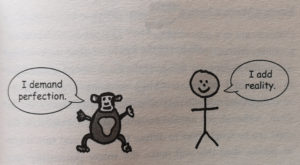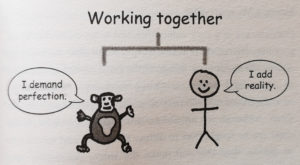Perfectionism – the curse of speakers
Perfectionism is the curse of speakers and presenters and a challenge for managers. Worse, it’s on the rise.
What kind of perfectionism plagues you?
What kind of perfectionism gets in your way? Excellence-seeking perfectionism that makes you fixate on, and demand, excessively high standards of yourself and others? Or failure-avoiding perfectionism that drives fear of losing people’s respect if you achieve anything less than perfection?

The Silent Guides by Prof Steve Peters
According to Prof Steve Peters’ The Silent Guides, the Human (rational thinking part of the brain) sees perfectionism as ‘doing the best I can’. The Human aims for perfection, but accepts that we don’t often get perfection and can be proud of having tried our best.
In contrast, the Chimp (part of the brain that makes snap judgments based on emotions and gut instinct) demands that we achieve perfection and drives the sense of failure if we deliver anything less.
Connection not perfection
As speakers and presenters, perfectionism gets in the way. Seeking excellence can leave us fixating on, for instance, getting our words right or memorising our speech, while missing the opportunity to connect with our audience.
Failure avoidance can find us paralysed with fear of making a mistake. Again, at the cost of connection.
Any speaker ‘shortcomings’ should always take a back seat to connecting with, and moving, our audience so that we impact how they think, feel and act after experiencing our speech.

The Silent Guides by Prof Steve Peters
To allow the possibility of connection overriding perfection, we need both our Chimp and our Human. Together, they can work to motivate us to do our best (Chimp) and subsequently accept that trying our best is good enough (Human).





